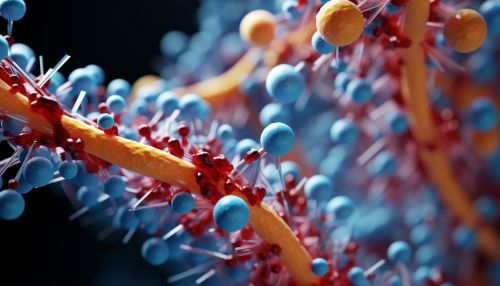Adenosine Deaminase Deficiency
Overview
Adenosine Deaminase Deficiency (ADA Deficiency) is a rare genetic disorder that affects the immune system, primarily characterized by a severe reduction in the number of white blood cells (lymphocytes). This disorder is caused by a deficiency in the enzyme adenosine deaminase, which plays a crucial role in the metabolism of purine and the development and maintenance of the immune system.


Genetics and Biochemistry
ADA Deficiency is an autosomal recessive disorder, meaning that an individual must inherit two copies of the defective gene, one from each parent, to develop the disease. The gene responsible for producing adenosine deaminase, ADA, is located on chromosome 20. Mutations in this gene lead to a reduction or absence of this enzyme, causing an accumulation of deoxyadenosine and adenosine, toxic metabolites that are harmful to lymphocytes.
Adenosine deaminase is a key enzyme in the purine salvage pathway, which recycles purines from degraded DNA to synthesize new DNA. Without functional adenosine deaminase, the toxic metabolites accumulate in the cells and the extracellular fluid, leading to lymphocyte apoptosis (cell death) and a severely compromised immune system.
Clinical Manifestations
The clinical manifestations of ADA Deficiency are primarily due to the severe immunodeficiency. Affected individuals are highly susceptible to recurrent and persistent infections, including bacterial, viral, and fungal infections. These infections can affect various parts of the body, including the respiratory system, gastrointestinal tract, skin, and urinary tract.
In addition to recurrent infections, individuals with ADA Deficiency may also exhibit failure to thrive, chronic diarrhea, skin rashes, and developmental delay. In severe cases, if left untreated, the disease can lead to early death due to severe infections.
Diagnosis
The diagnosis of ADA Deficiency is based on clinical findings, family history, and specialized laboratory tests. The laboratory tests typically involve measuring the level of adenosine deaminase in the blood and other tissues. Genetic testing can also be performed to identify mutations in the ADA gene.
Prenatal diagnosis is possible through amniocentesis or chorionic villus sampling, where fetal cells are tested for the presence of the ADA gene mutation.
Treatment
The primary treatment for ADA Deficiency is bone marrow transplantation, preferably from a matched sibling donor. This treatment can restore the immune function in affected individuals. However, it carries risks, including graft-versus-host disease and transplant-related mortality.
Enzyme replacement therapy with pegademase bovine, a form of adenosine deaminase derived from cows, can be used to manage the disease. This treatment involves regular injections of the enzyme and can reduce the severity of the symptoms but does not cure the disease.
Gene therapy, where a normal ADA gene is inserted into the patient's own blood stem cells, is a promising treatment option. This therapy has been successful in several clinical trials and may become a standard treatment in the future.
Prognosis
The prognosis for individuals with ADA Deficiency varies depending on the severity of the disease and the success of the treatment. With successful bone marrow transplantation or gene therapy, individuals can lead a normal life with a functional immune system. However, without treatment, the disease is usually fatal in early childhood due to severe infections.
